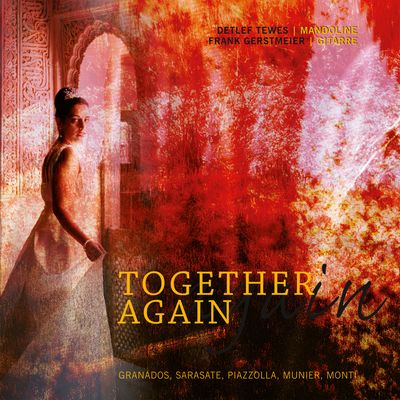Together again

Additional information to the cd "Together again"
Detlef and Frank met first time as teenager in the late seventies at musical gatherings to encourage young talents. After the founding of the national youth orchestra of plucked instruments. They were appointed to be leaders of first mandolin and guitars. Already at that time there was a certain blind understanding and similar musical expression significantl to be noticed. In the nineties they played together as a duo for a certain time and now recently they joined again for their third musical spring. This is at least the saison they feel...
Of course the title of this CD is a impudent flamboyance considering the important musical predecessors! Dear big Js: forgive us...
Or
Dear John and Julian: forgive us...
We start with 'Libertango' by Astor Piazzolla. Playing his 'Histoire du Tango' in concert - which will showit is to anticipate up later on this CD - 'Libertango' always is our choice for the fourth and last movement. As we never got close and intimate with Astor's original fourth piece. Libertango for us represents the expressiveness of the modern tango of today, the tango nuevo. Starting the CD with it, it is to anticipate the entity and the moods of the pieces of this recording. And to paint an appropriate sound picture to Katja's fantastic cover design... Rehearlsing this piece we found out that Detlef can move his right hand more than 1,000 times per minute. The hand gets slightly out of sight, you can't even hear that fast. So he plays only two strokes per quaver for tremolo in the middle section. Must be enough!
Granados' collection of poetic waltzes seem to be sent from heaven. After an introduction which is obviously only consisting of A-major the waltzes carry us away until the very free f#-waltz stops the grown and in the meantime rustique splendor is stopped suddenly. Dark colors - a dark poem. Rico solves this complicated situation with a trickling and em slightly cascading lightness and as last waltz also adds a almost transforming waltz before coming back to the conciliatory first waltz and so the circle is closed… Everytime one hears it you can renew your inner pottry. Astor's ,masterpoece gets beating right in the beginning, percussion from the guitar. so you can hear the wood of the guitar. Like many good musical styles e.g. the jazz also the tango receives it's erotic sensation and the down-to-earthness from the brothel atmosphere of the outskirts of Buenos Aires. The first movement of the 'Histoire' is still folkloristic with the typical phrases and variations of moods. In the 'Cafe' from the times of famous Carlos Gardell the tango has to be cantabile. Here the influences of the italian and spanish immigrants into the 'silver land' are significant. Melancholy and expression seem to be almost within reach. 30 years later the 'Nightclub' shows us steady speed and great emotions on a narrow spot??? It is a real stairway to heaven ly feelings. Just arrived there in concerts we usually go on with 'Libertango' which here is the opener of the CD.
The european counterpart of these passions and emotions are to be found in the almost not ending Phrases of the Zigeunerweisen, which means Gypsy Melodies. Sarasate's piece of art is always young fresh in all it's deepness. We never get tired to play this piece -even when we at the end sometimes feel an air stream in our faces because of the speed!
Carlo Munier's lively spanish Capricho is a spanish flan on an italian base. Here Detlef' and Frank's roots in the traditional music of mandolin orchestras can no longer be denied. And now to make the orchestra only out of two instruments is simply great fun. Carlo's entertaining style of composing, always trying to touch the upper limits of the players: we take a deep bow to him!
And now Carmen! She always wants tobe 'conquered' - also her fantasy and imagination. Bizet's great music, transformed by Sarasate' 'virtuosic generator' is the pure acoustic trip to spain. To bring the Habanera from the orchestra to a guitar version: here Andres Segovia' famous say from the guitar as a six stringed orchestra had to come true. Pablo's Carmen is presenting everything a Duo can ask for. Intimate or orchestral, from colourful to ecstatic...
And like an encore, but only last and not least: Monti's Czardas. Frank's version is always changing slightly. So this take of the intro is like a picture of the moment. And then the piece starts moving in an irresistable manner. One last interruption by a heavenly memory of the intimate spots of this CD, before the final gets into sight. Like a last straight before reaching the finnish. With full throttle - opening it right up!